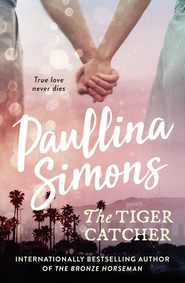По всем вопросам обращайтесь на: info@litportal.ru
(©) 2003-2024.
✖
Tatiana and Alexander
Настройки чтения
Размер шрифта
Высота строк
Поля
All six men crawled to the jeep. The three NKVD troops ordered the men to get into the back. Both Ouspensky and Maikov glanced at Alexander with considerable anxiety.
“Just get in.”
Two of the NKVD men got into the back with them. Ouspensky and Maikov breathed out in relief.
Alexander took out a cigarette and passed one to Nikolai and to white-faced Maikov who refused.
“Why did you do that?” whispered Ouspensky to Alexander.
“I’ll tell you,” said Alexander. “I did it because I just didn’t feel like getting promoted.”
Back on shore, the jeep proceeded to headquarters, passing a medical truck heading for the river. Alexander spotted Dr. Sayers in the passenger seat. Alexander managed a smile as he smoked, though he noticed the tips of his fingers trembling. It was going as well as could be expected. The scene on the lake genuinely looked like the aftermath of a German onslaught. Dead men on the ice, one truck down. Sayers would write out the death certificate, sign it, and it would be as if Alexander had never existed. The NKVD would be grateful—they preferred making their arrested parties invisible anyway—and by the time Stepanov learned of what had really happened, and that Alexander was still alive, Tatiana and Sayers would be long gone. Stepanov would not have to lie to Tatiana. Lacking any actual information, he himself would believe that Alexander, with Ouspensky and Maikov, had perished on the lake.
He ran a hand over his capless head and closed his eyes, quickly opening them again. The bleak Russian landscape was better than what was behind his closed lids.
Everybody won. The NKVD would not have to answer questions from the International Red Cross, the Red Army would pretend to mourn a number of downed and drowned men, while Mekhlis still had his paws on Alexander. Had they wanted to kill him, they would have killed him instantly. Those were not their orders. He knew why. The cat wanted to play with the mouse before he ripped the mouse to pieces.
It was eight in the morning by the time they got back to Morozovo, and since the base was coming to life and since they had to be hidden until they could be safely transported to unsafety, Alexander, Ouspensky and Maikov were thrown into the stockade in the basement of the old school. The stockade was a concrete cell just over a meter wide and less than two meters long. The militia ordered the three soldiers to lie flat on the floor and not move.
The cell was too short for Alexander; there was not enough room to lie down on the floor. As soon as the guards left, the three men crouched on the ground, drawing their knees up to their chests. Alexander’s wound was throbbing. Sitting on the cold cement wasn’t helping.
Ouspensky kept on at him. Alexander said, “What do you want? Stop asking. This way when you’re questioned you won’t have to lie.”
“Why would we be questioned?”
“You’ve been arrested. Isn’t that clear?”
Maikov was looking into his hands. “Oh, no,” he said. “I’ve got a wife, a mother, two small children. What’s going to happen?”
“You?” said Nikolai. “Who are you? I’ve got a wife and two sons. Two small sons. I think my mother is still alive, too.”
Maikov didn’t reply, but both he and Ouspensky turned to stare at Alexander. Maikov lowered his gaze. Ouspensky didn’t.
“All right,” said Ouspensky. “What did you do?”
“Lieutenant!” Alexander pulled rank whenever and wherever necessary. “I’ve heard enough from you.”
Ouspensky remained undaunted. “You don’t look like a religious zealot.”
Alexander was silent.
“Or a Jew. Or a skank.” Ouspensky looked him over. “Are you a kulak? A member of the Political Red Cross? A closet philosopher? A socialist? A historian? Are you an agricultural spoiler? An industrial wrecker? An anti-Soviet agitator?”
“I’m a Tatar drayman,” said Alexander.
“You will get ten years for that. Where is your dray? My wife would find it very useful for hauling onions from nearby fields. Are you telling me we were arrested because we had the fucking bad luck to be bedded next to you?”
Maikov emitted a whimper that bordered on a wail. “But we know nothing! We did nothing!”
“Oh?” said Alexander. “Tell that to the group of musicians and a small audience that used to gather in the early thirties for an evening of piano without clearing it first with the housing council. To help defray the costs of the wine, they would collect a few kopecks from each person. When they were all arrested for anti-Soviet agitation, the money they had collected was deemed to have gone to prop up the nearly extinct bourgeoisie. The musicians and the audience all got from three to ten years.” Alexander paused. “Well, not all. Only those who confessed to their crimes. Those who refused to confess were shot.”
Ouspensky and Maikov stared at him. “And you know this how?”
Alexander shrugged. “Because I, being fourteen, escaped through the window before they had a chance to catch me.”
They heard someone coming and fell quiet. Alexander stood up, and as the door was opened, Alexander said to Maikov, “Corporal, imagine your old life is gone. Imagine they’ve taken from you all they can and there is nothing left—”
“Come, Belov, let’s go!” shouted a stout man with a single-shot Nagant rifle.
“It’s the only way you will make it,” Alexander said, stepping out of the cell and hearing the door slam closed behind him.
He sat in a small room in the abandoned school, in a school chair, in front of a table that was in front of a blackboard. He thought at any minute the schoolmaster was going to come in with a textbook and proceed with the lesson on the evils of imperialism.
Instead two men came in. There were now four people in the room, Alexander in the chair, a guard at the back of the class and two men behind the teacher’s table. One man was bald and very thin with a long, thoughtful nose. He introduced himself kindly as Riduard Morozov. “Not the Morozov of this town?” asked Alexander.
Morozov smiled thinly. “No.”
The other man was extremely heavy, extremely bald and had a round bulbous nose with broken capillaries. He looked like a heavy drinker. He introduced himself—somewhat less kindly—as Mitterand, which Alexander found almost humorous since Mitterand was the leader of the tiny French “Resistance movement in Nazi-occupied France.
Morozov began. “Do you know why you’re here, Major Belov?” he asked, smiling warmly, speaking in polite, friendly tones. They were having a conversation. In a moment Mitterand was going to offer Alexander some tea, maybe a shot of vodka to calm him. Alexander thought of it as a joke, but oddly, the bottle of vodka actually did materialize from behind a desk, along with three shot glasses. Morozov poured.
“Yes,” Alexander said brightly. “I was told yesterday I’m getting promoted. I’m going to be lieutenant colonel. And no, thank you,” he said to the drink being offered to him.
“Are you refusing our hospitality, Comrade Belov?”
“I am Major Belov,” Alexander said, standing up and raising his voice to the man in front of him. “Do you have a rank?” He waited. The man said nothing. “I didn’t think so. You’re not wearing a uniform. If you had a uniform to wear, you would be wearing it. Now, I will not have your drink. I will not sit down until you tell me what you want with me. I will be glad to cooperate in whatever way I can, comrades,” he added, “but don’t sit there and insult me by pretending we’re the best of friends. What’s going on?”
“You’re under arrest.”
“Ah. So no promotion then? It only took you since four this morning. Ten hours. You have not told me what you want with me. I don’t know if you know yourselves. Why don’t you go and find someone who can actually tell me? In the meantime, take me back to my cell and stop wasting my time.”
“Major!” That was Morozov. The voice was less kind. The vodka, however, had been drunk by both men. Alexander smiled. If he kept them in the classroom drinking, they’d be leading him to the Soviet-Finnish border themselves, talking to him in soft English. They called him major. Alexander understood the psychology of rank extremely well. In the army there was only one rule—you never spoke rudely to your superiors. The pecking order was precisely established. “Major,” Morozov repeated. “Stay right here.”
Alexander returned to his chair.
Mitterand spoke to the young guard by the door; Alexander didn’t hear the individual words. He understood the essence. This was not only out of Morozov’s hands, this was out of his league. A bigger fish was needed to deal with Alexander. And soon the fish would be coming. But first they were going to try to break him.
“Put your hands behind your back, Major,” said Morozov.
Alexander threw his cigarette on the floor, twisted his foot over it, and stood up.
They relieved him of his sidearm and his knife and pillaged through his rucksack. Having found bandages and pens and her white dress—nothing worth removing—they decided to take Alexander’s medals off his chest, and they also tipped his shoulder bars and they told him he was not a major anymore and had no right to his title. They still hadn’t told him the charges against him, nor had they asked him any questions.
He asked for his ruck. They laughed. Almost helplessly, he glanced at it once, in their hands, knowing Tatiana’s dress was there. Just one more thing to be trampled on, to be left behind.
Alexander was taken to a solitary concrete cell with no window, no Ouspensky, no Maikov. He had no bench, he had no bed, and he had no blanket. He was alone, and his only sources of oxygen came from the guards opening the door, or from opening the sliding steel reinforced window on the door, or from the peephole they peered at him through, or from the small hole in the ceiling that was probably used for poison gas.
They left him his watch, and because they didn’t search his person they did not find the drugs in his boots. He had a feeling the drugs were not safe. But where to put them? Slipping off the boots, he took the syringe, the morphine vial and the small sulfa pills and stuffed them in the pocket of his BVDs. They would have to search more thoroughly than they usually did to find them there.











